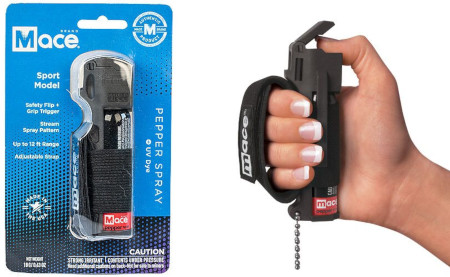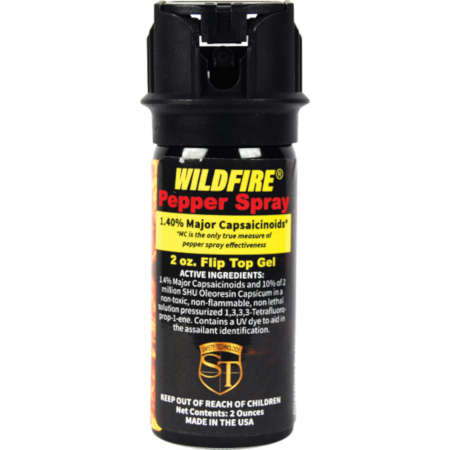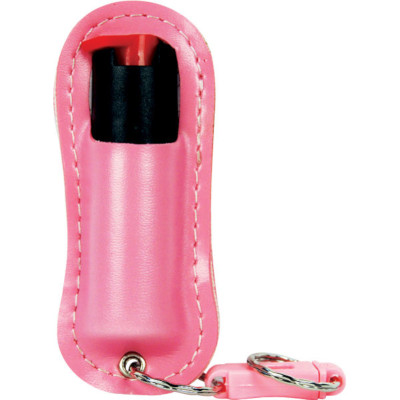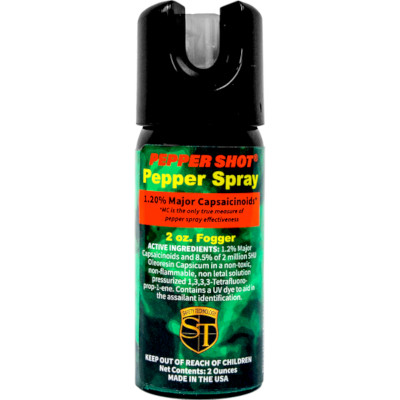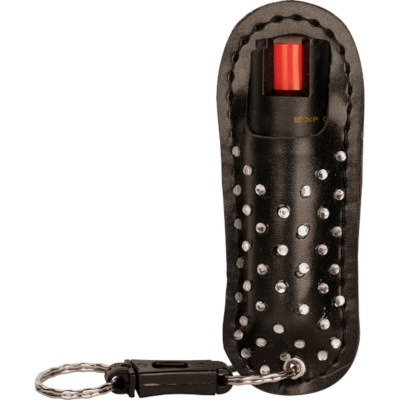Pepper Spray Guide
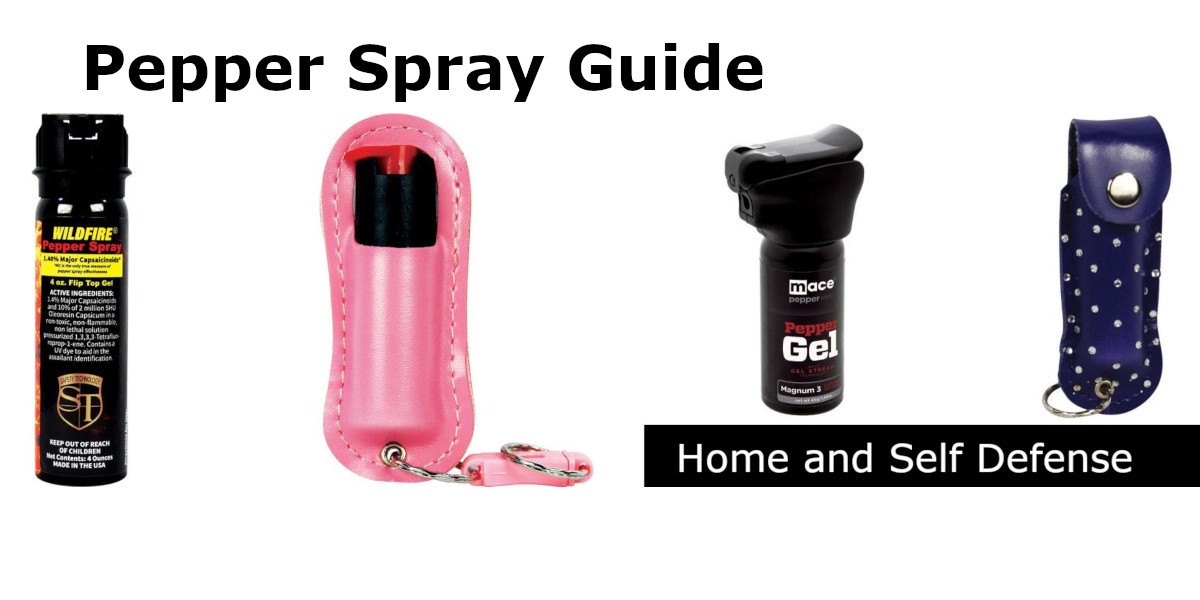
Pepper spray is one of the most effective, accessible, and non-lethal self-defense tools available today. Whether you're protecting yourself while jogging or preparing for an emergency, this guide will cover everything you need to know about choosing, using, and maintaining pepper spray. From understanding how pepper spray works to knowing the legal restrictions in your state, we’ve got you covered.
Table of Contents
- What Is Pepper Spray and How Does It Work?
- Types of Pepper Spray
- How to Choose the Right Pepper Spray
- Legality of Pepper Spray
- How to Use Pepper Spray Safely and Effectively
- Pepper Spray for Personal and Home Defense
- Maintaining and Storing Pepper Spray
- Common Myths About Pepper Spray
- Related Products: Pepper Spray Accessories
- Conclusion - Take Control of Your Safety Today
What Is Pepper Spray and How Does It Work?
Pepper spray, also known as OC spray (short for Oleoresin Capsicum), is a highly effective self-defense tool designed to incapacitate an attacker by causing severe irritation to the eyes, respiratory system, and skin. It is made from capsaicin, the chemical compound that gives chili peppers their intense heat. When deployed, pepper spray can cause temporary blindness, difficulty breathing, and an overwhelming burning sensation, giving the victim a chance to escape from the attacker.
Quick Facts:
- Pepper Spray Active Ingredient: Capsaicin
- Effect Duration: 15 minutes to 1 hour
- Spray Range: 6 to 25 feet, depending on the type
- Legal in Most States: Yes, but laws vary
How Do Self Defense Sprays Work?
When sprayed, pepper spray works by inflaming the mucous membranes in the eyes, nose, throat, and lungs of the attacker. The effects of pepper spray typically include:
- Temporary blindness due to the dilation of the eye’s capillaries.
- Difficulty breathing caused by swelling in the lining of the airways.
- Intense burning on the skin and in the respiratory system, resulting in coughing, gagging, and disorientation.
These effects can last anywhere from 15 minutes to over an hour, depending on the potency and amount of spray used. However, the effects are temporary and non-lethal, making pepper spray a popular choice for self-defense without causing permanent harm.
Capsaicin: The Active Ingredient
The primary ingredient in pepper spray is capsaicin, a natural chemical derived from hot peppers. Capsaicin is measured using the Scoville Heat Unit (SHU) scale, which determines the heat or potency of the spray. Most commercial pepper sprays range from 500,000 to 5 million SHUs, though some law enforcement-grade sprays can be even stronger.
The intensity of the spray depends on the concentration of Oleoresin Capsicum (OC) in the product, which can range from 0.18% to 1.3%. The higher the concentration, the more severe the effects, though most personal-use sprays are designed to be strong enough to stop an attacker without being overly dangerous.
Why Is Pepper Spray Effective?
Pepper spray is effective because it targets the attacker’s ability to see and breathe, both of which are essential in an aggressive confrontation. The involuntary response to pepper spray—shutting the eyes, coughing uncontrollably, and experiencing intense pain—creates an opportunity for the victim to escape and seek help. Even attackers under the influence of drugs or alcohol are often incapacitated by pepper spray due to its powerful inflammatory effects.
Types of Pepper Spray
Not all pepper sprays are created equal, and choosing the right one depends on your personal safety needs. The main types of pepper spray are classified based on their spray patterns, each offering unique advantages in different situations. Understanding the pros and cons of each type can help you choose the best pepper spray for your self-defense.
1. Stream Pepper Spray
Stream pepper spray is one of the most common types, releasing a concentrated stream of spray that allows for greater accuracy. It works best in outdoor or open areas where you need to target a specific individual at a distance.
Advantages:
- Long range: Can typically reach distances of 15 to 20 feet, allowing you to stop an attacker before they get too close.
- Less blowback: The focused stream reduces the chances of the spray blowing back into your face due to wind.
- Accuracy: Ideal for one-on-one confrontations where you need to aim directly at the attacker's face.
Disadvantages:
- Precision required: You need good aim for it to be effective, especially under stress.
Best for: Outdoor use, joggers, and those who want to maintain distance from an attacker.
2. Fogger/Cone Pepper Spray
Fogger pepper spray releases a wide mist or cone-shaped cloud of spray, making it easier to hit multiple attackers or cover a large area. The downside is that the mist is more likely to blow back toward you, especially in windy conditions.
Advantages:
- Covers a wide area: Excellent for crowd control or multiple attackers.
- No need for precision: It’s harder for the attacker to dodge, making it useful when you’re under pressure.
Disadvantages:
- Shorter range: Typically only reaches about 8 to 10 feet.
- Risk of blowback: Wind can blow the spray back toward you, so it's not ideal for outdoor use on windy days.
Best for: Indoor use, crowd control, or situations where multiple attackers are present.
3. Gel Pepper Spray
Gel pepper spray is a newer type that releases a thick gel, sticking to the target's face and reducing the chances of blowback. This is particularly useful indoors or in windy environments.
Advantages:
- Less blowback: The thick gel sticks to the attacker’s face and is less likely to affect you.
- Greater range: Can shoot up to 25 feet, giving you a wider safety zone.
- Disorienting effect: Gel is harder to wipe off, making it more disorienting for the attacker.
Disadvantages:
- Narrow spray: Since the gel doesn’t disperse like a mist or fog, it requires better aim.
Best for: Indoor use, windy environments, or individuals who want to avoid blowback.
4. Foam Pepper Spray
Foam pepper spray creates a thick, foamy substance when released, which is designed to stick to the attacker’s face and eyes. Like gel spray, foam is less likely to blow back and is more effective at close range.
Advantages:
- Highly visible: Foam creates a visible coating on the attacker, making it harder for them to wipe off and disorienting them.
- Less blowback: The foam sticks to the target, minimizing the risk of blowback.
- Great for close range: Ideal for use at shorter distances, like indoors or in tight spaces.
Disadvantages:
- Limited range: Typically has a shorter range compared to stream or gel sprays.
Best for: Indoor or close-range situations where you want the attacker incapacitated quickly.
Related Blog Post:
For more insights into the different types of pepper spray, check out these related articles:
- Pepper Spray vs Mace: What’s the Difference and Which Is Better? – A comparison between two of the most popular self-defense sprays.
How to Choose the Right Pepper Spray
Selecting the right pepper spray can be overwhelming with the variety of options available, but the key to making the right choice lies in understanding your personal needs and the specific features of each product. From potency to spray patterns and legal considerations, this section will guide you through the important factors to consider when choosing the best pepper spray for your safety.
1. Potency and Scoville Heat Units (SHU)
Pepper spray potency is measured by Scoville Heat Units (SHU), which reflect the strength of the capsaicin—the active ingredient responsible for the burning sensation. The higher the SHU, the more intense the effects on the attacker.
Most commercial pepper sprays have a rating between 500,000 and 5,000,000 SHU, though some law enforcement-grade sprays can be even stronger. A high concentration of Oleoresin Capsicum (OC), typically ranging from 0.18% to 1.3%, increases the spray's potency and effectiveness.
- Tip: For personal defense, a spray with 2-3 million SHU is usually more than sufficient to incapacitate an attacker without being overly strong for civilian use.
2. Spray Pattern and Range
Pepper sprays come in different spray patterns, and the one you choose depends on your environment and how comfortable you are using the product.
-
Stream Spray: Ideal for outdoor use, offering longer range and accuracy (up to 15–20 feet). However, it requires good aim and precision.
-
Gel Spray: Best for windy conditions or indoor environments, with minimal blowback and a longer range of up to 25 feet. It sticks to the attacker, making it harder to remove.
-
Fog/Cone Spray: Great for covering a wider area or dealing with multiple attackers, though the shorter range (8–10 feet) and increased risk of blowback in windier conditions should be considered.
-
Foam Spray: Ideal for close-range use, producing a thick foam that coats the attacker’s face and eyes, making it difficult to remove.
Tip: If you often find yourself outdoors or in windy conditions, consider a gel spray to reduce blowback. For indoor use, foam or stream spray might be a better option depending on your environment.
3. Size and Portability
Pepper sprays come in a variety of sizes, from small, discreet keychain models to larger canisters designed for home or vehicle use. Choosing the right size depends on how you plan to carry and use the spray.
Keychain Models: Small and discreet, these are easy to carry at all times and are ideal for quick access while jogging, commuting, or running errands. They typically have a shorter range but are highly portable.
Keychain Pepper Shot with Quick Release
-
Mid-Sized Models: These are larger than keychain sprays but still compact enough to fit in a purse or glove box. They provide a longer range and more spray capacity, making them great for personal defense in everyday situations.
-
Large Canisters: Best for home defense or keeping in your car, large canisters offer extended range and more bursts, but they’re not practical for carrying on your person.
Tip: If you're looking for something you can carry daily, keychain or mid-sized sprays offer the best balance of portability and effectiveness.
4. Additional Features
Some pepper sprays come with additional features that can enhance your safety and ease of use. These may include:
-
Built-in LED Flashlight: Helps illuminate dark areas and can temporarily blind an attacker, making it easier to aim the spray.
-
UV Marking Dye: Some sprays contain UV dye that marks the attacker’s skin, making it easier for law enforcement to identify them later.
-
Safety Mechanisms: Look for sprays with flip-top or twist-lock safety caps to prevent accidental discharge.
Tip: If you often find yourself in low-light situations, a pepper spray with a built-in flashlight can be a helpful feature.
Legality of Pepper Spray
Before purchasing or carrying pepper spray, it's important to be aware of the laws and regulations that govern its use. While pepper spray is legal in most states and countries for personal defense, there are specific rules that vary by jurisdiction. Understanding these legal guidelines can help you avoid fines, legal trouble, or the confiscation of your self-defense tool.
1. General Pepper Spray Laws
In the United States, pepper spray is considered a non-lethal self-defense weapon, and it is legal to carry in most states. However, the amount of pepper spray you can carry, where you can buy it, and how it can be used may differ depending on your location.
- Size and Strength Restrictions: Some states limit the size of the canister or the concentration of Oleoresin Capsicum (OC), the active ingredient in pepper spray.
- Purchase Restrictions: In some areas, you can only purchase pepper spray from licensed dealers or specific stores, like pharmacies or firearms dealers.
It's essential to know the specifics of your state or region's laws before purchasing or using pepper spray. Ignorance of the law is not a valid defense in case of legal issues.
2. State-by-State Regulations
Here are a few examples of state-specific pepper spray laws in the U.S.:
-
California: Pepper spray is legal for civilian use, but the canister size is limited to 2.5 ounces or less. Any misuse of pepper spray, such as using it in non-self-defense situations, is considered a criminal offense.
-
New York: Pepper spray can only be purchased from a licensed firearms dealer or pharmacist. It is illegal to ship pepper spray into New York from other states, and only certain types of spray are allowed for civilians.
-
Massachusetts: Previously, a firearms identification card was required to purchase pepper spray. However, as of 2014, civilians no longer need a license to carry pepper spray, though it must be purchased within the state.
-
Michigan: Pepper spray is legal, but the concentration of Oleoresin Capsicum (OC) must not exceed 10%.
-
Washington D.C.: As of 2017, residents are no longer required to register their pepper spray with the local police department before carrying it.
Tip: Always check local laws before purchasing pepper spray to ensure you are compliant. Carrying an illegal type or size can result in fines or other penalties.
Always check your state’s current pepper spray laws to ensure you’re complying with regulations.
3. International Pepper Spray Laws
Laws governing the use of pepper spray can vary dramatically between countries:
-
Canada: It is illegal for civilians to carry pepper spray for personal defense. However, bear spray (a similar product intended for animal defense) is legal.
-
United Kingdom: Pepper spray is classified as a firearm and is illegal to carry or use. Civilians found in possession of pepper spray can face serious legal penalties.
-
Australia: Pepper spray is restricted to law enforcement and security personnel in most states. Some states allow civilians to carry pepper spray with a permit.
-
Germany: Pepper spray is legal for use against animals, but civilians must declare it as an animal repellent. Using it against humans could result in legal action unless it's in clear self-defense.
4. Misuse and Legal Consequences
Misusing pepper spray can lead to significant legal trouble. Using pepper spray in non-defensive situations, such as during an argument or altercation that doesn't involve a genuine threat, is considered a criminal offense in most jurisdictions. Similarly, using pepper spray to attack someone without cause can result in assault charges.
It's also important to remember that pepper spray is intended as a last resort in self-defense. Spraying someone for minor threats or without provocation could result in civil lawsuits or criminal prosecution.
Pro tip: Always use pepper spray in accordance with local laws and only in situations where your personal safety is at risk.
Related Blog Posts:
For more information on the legality of pepper spray in different locations, check out these related articles:
- Is Pepper Spray Legal in California? – A state-specific guide to the legal use of pepper spray in California.
- Is Pepper Spray Legal in NJ? Understanding the Laws and Regulations – A breakdown of New Jersey’s pepper spray laws.
How to Use Pepper Spray in Self Defense
While pepper spray is an effective self-defense tool, its proper use is essential to ensure your safety and to incapacitate an attacker. Knowing when and how to deploy pepper spray can be the difference between a successful defense and putting yourself or others at risk. This section provides practical tips for carrying, deploying, and using pepper spray effectively in real-life situations.
1. Carrying Pepper Spray for Quick Access
In a dangerous situation, quick access to your pepper spray is critical. Always keep it in a location where it’s easy to reach, whether you’re carrying it on a keychain, in your pocket, or attached to your belt. Ensure that it’s in a position where you can grab it quickly without fumbling, especially in high-stress situations.
Tips for carrying pepper spray:
- Use a keychain or holster: Many pepper sprays come with keychain attachments or holsters for easy access. Clip it onto your keys, belt loop, or purse strap for quick retrieval.
- Keep it in your hand when walking alone: If you’re in an unfamiliar or potentially unsafe area, keep the pepper spray in your hand, with your thumb near the trigger, so you can deploy it instantly if needed.
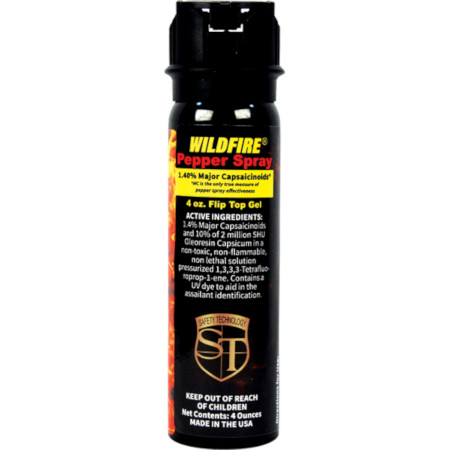
Home Defense Pepper Gel
Featuring a potent 1.4% Major Capsaicinoid formula, Wildfire Pepper Gel delivers maximum heat for effective personal protection. Bold and powerful, it’s ideal for quick defense in any situation.
2. Know the Safety Mechanism
Most pepper sprays come with a manual safety mechanism to prevent accidental discharge. It’s important to familiarize yourself with this feature so you can disengage it quickly when necessary. Read the instructions to ensure you know how it works. The two most common safety mechanisms are:
- Flip-top safety caps: These require you to flip the cap with your thumb before pressing the trigger.
- Twist-lock safety caps: These require you to twist the nozzle into the “unlock” position before use.
Tip: Practice disengaging the safety mechanism so that you can do it instinctively, even under stress.
3. How to Deploy Pepper Spray
When using pepper spray, aim for the attacker’s face, specifically targeting the eyes, nose, and mouth. These areas are most sensitive to the effects of the spray, and a direct hit will maximize its impact.
Steps to use pepper spray effectively:
- Hold the spray with your dominant hand: Grip the canister firmly and ensure your thumb or finger is on the trigger.
- Aim for the attacker’s face: Keep a safe distance—most pepper sprays are effective from 6 to 12 feet away. Aim for the eyes and nose, as this will cause immediate discomfort and disorientation.
- Use short bursts: Rather than holding the spray down continuously, use short 1-2 second bursts. This conserves the spray and helps ensure accuracy.
- Move while spraying: If possible, move away from the attacker while spraying to create more distance and make it harder for them to reach you.
Tip: Remember to shout commands like "STOP!" or "GET BACK!" while spraying. This can further disorient the attacker and may attract help from bystanders.
4. Recognize Wind and Environmental Factors
When using pepper spray outdoors, be aware of the wind direction. If the wind is blowing toward you, deploying pepper spray could result in blowback, affecting you instead of the attacker.
Tips to reduce blowback:
- Stand upwind: If possible, position yourself upwind from the attacker to avoid the spray blowing back into your face.
- Use gel spray: If you frequently find yourself outdoors, consider using gel pepper spray, which is less affected by wind compared to stream or fogger sprays.
5. What to Do After Spraying
After successfully deploying pepper spray, your goal should be to escape the situation as quickly as possible. Pepper spray is designed to temporarily incapacitate the attacker, giving you time to create distance and seek help.
- Move to safety: After spraying the attacker, quickly move away and seek help. If you're in a public place, head towards a well-lit area or a place with other people.
- Call for help: If possible, immediately call the police or alert security personnel to report the incident.
Tip: If the attacker continues to pursue you after being sprayed, continue using short bursts to maintain the effect and prevent them from closing in on you.
Pepper Spray for Personal and Home Defense
Pepper spray is not only a versatile tool for personal defense while you’re out and about, but it can also play an important role in securing your home. Whether you're walking alone at night or looking for a way to defend yourself and your family at home, pepper spray provides a reliable, non-lethal option to incapacitate potential threats.
1. Personal Defense: Staying Safe on the Go
Carrying pepper spray while on the go is one of the easiest and most effective ways to protect yourself. Whether you’re jogging, walking through a parking lot, or commuting late at night, having pepper spray within reach can give you peace of mind and a tool to defend yourself from potential attackers.
Why pepper spray is ideal for personal defense:
- Lightweight and portable: Most pepper sprays are small enough to fit on a keychain, in a purse, or in a pocket, allowing for quick access.
- Effective deterrent: Pepper spray can incapacitate an attacker for up to 45 minutes, giving you ample time to escape and seek help.
- Non-lethal: Pepper spray offers a non-lethal alternative to other self-defense tools, making it a popular choice for those who want to protect themselves without carrying a weapon.
Situations where pepper spray excels:
- Jogging or walking alone: Many runners carry pepper spray to protect against both human attackers and aggressive animals.
- Late-night commutes: Pepper spray is easy to conceal and can be quickly deployed in parking lots, dark streets, or other potentially dangerous areas.
- Public transportation: Compact pepper spray devices are ideal for use in confined spaces like buses or subway stations, offering an additional layer of protection.
Tip: Always carry pepper spray in an easily accessible place, such as in your hand or attached to your keychain, especially if you’re entering an area where you might feel vulnerable.
2. Home Defense: Protecting Your Family
In addition to personal protection, pepper spray can be used as a part of your home defense strategy. Keeping pepper spray near entry points like doors and windows, or in easily accessible locations in your home, can help you defend yourself if an intruder enters.
Why pepper spray is effective for home defense:
- No close contact needed: Unlike other home defense tools like batons or stun guns, pepper spray allows you to incapacitate an intruder from a distance (typically 6 to 15 feet), reducing the risk of direct confrontation.
- Non-lethal option: Pepper spray provides a safer alternative to firearms, especially in households with children. It effectively neutralizes threats without the risk of permanent injury or accidental discharge.
- Wide area coverage: Depending on the type of spray, pepper spray can affect larger areas, especially if you use fogger sprays that can cover more ground, making it harder for intruders to avoid.
Pepper Shot 2 oz. Fogger Spray
Designed for wide-area defense, this 1.2% Major Capsaicinoid formula provides maximum coverage to incapacitate multiple attackers at once. Ideal for crowd control or securing larger spaces with ease.
Where to store pepper spray in your home:
- Near entry points: Keep pepper spray near doors, windows, or anywhere an intruder might try to gain access to your home.
- In the bedroom: Having pepper spray within reach in your bedroom can give you quick access to a defense tool if you’re awakened by an intruder during the night.
- In common areas: Storing pepper spray in living rooms or hallways ensures easy access when moving through the house.
Tip: In addition to having pepper spray, it’s a good idea to have a plan for escape and alerting the authorities. Pepper spray should be used to buy you time to get to safety and call for help.
3. Pepper Spray for Family Protection
Pepper spray can also be used to protect family members, especially those who may be more vulnerable, such as elderly relatives or teenagers. Teaching your family members how to use pepper spray properly can increase their sense of security and prepare them for emergencies.
Best uses of pepper spray for family protection:
- Personal alarms: Combine pepper spray with a personal alarm for elderly family members, giving them a way to defend themselves and alert others in case of danger.
- Self-defense training: Teach teenagers or college students how to use pepper spray as part of their self-defense education. Having pepper spray on hand can help them feel more secure when they are alone or away from home.
Tip: Make sure everyone in your household knows where the pepper spray is located and how to use it safely. Practice scenarios where family members can quickly grab and deploy pepper spray in case of an emergency.
4. Can Pepper Spray Blind You? Understanding the Risks and Effects
Pepper spray is a highly effective self-defense tool, but many people wonder: Can pepper spray cause blindness? While the effects are intense and temporarily incapacitating, permanent blindness is extremely rare.
How Pepper Spray Affects the Eyes
Pepper spray contains oleoresin capsicum (OC), the active ingredient derived from hot peppers. When sprayed into the eyes, it causes:
- Severe burning sensation
- Excessive tearing and involuntary eye closure
- Temporary swelling of the mucous membranes
- Blurred vision lasting up to 30 minutes
These effects are designed to incapacitate an attacker long enough for you to escape safely.
Can It Cause Permanent Eye Damage?
Studies show that temporary irritation is the most common effect, but in rare cases, prolonged exposure or improper treatment (like excessive rubbing) can cause corneal abrasions. However, permanent blindness is extremely unlikely unless:
- The person has a pre-existing eye condition.
- The spray is used at an extremely close range.
- The eyes are not properly flushed after exposure.
How to Treat Pepper Spray Exposure
If you or someone else is sprayed:
- Do not rub your eyes – this can worsen irritation.
- Blink rapidly to encourage natural tearing.
- Rinse with cool water or saline solution (do not use soap).
- Seek medical attention if symptoms persist beyond an hour.
By understanding how pepper spray works and how to mitigate its effects, you can use it confidently as a non-lethal self-defense tool.
Maintaining and Storing Pepper Spray
Pepper spray is a reliable self-defense tool, but to ensure it’s effective when you need it most, proper maintenance and storage are crucial. Over time, pepper spray can lose its potency, and improper storage can lead to malfunction or accidental discharge. This section covers the best practices for maintaining and storing your pepper spray so it's always ready for use.
1. Check the Expiration Date
Pepper spray canisters typically come with an expiration date, which is usually between 2 to 4 years from the date of manufacture. After this time, the propellant in the canister may lose its pressure, and the spray itself can lose its potency. Using expired pepper spray could result in a weaker spray or reduced effectiveness in deterring an attacker.
- Tip: Check the expiration date on your pepper spray canister periodically and replace it before it expires to ensure maximum effectiveness.
- What to do with expired pepper spray: Do not throw expired pepper spray in the trash. See the section on safe disposal below for proper handling.
2. Test Your Pepper Spray Regularly
Testing your pepper spray is an important part of maintenance to ensure it functions correctly and is ready when you need it. However, avoid over-testing, as this can deplete the contents of the canister.
How to test your pepper spray:
- Take your spray to an outdoor area, away from people and animals.
- Ensure you're standing upwind to avoid any blowback.
- Give the canister a quick 1-second burst to confirm it sprays correctly.
- Check that the spray pattern (stream, gel, fog, etc.) is functioning as expected.
Tip: Test your pepper spray every 3 to 6 months to make sure it’s still working properly and that you’re familiar with how to use it.
3. Store Pepper Spray in a Safe, Accessible Location
Proper storage of pepper spray is essential to prevent accidental discharge and to ensure it’s easily accessible in case of an emergency. Here’s how to store it safely:
-
Avoid extreme temperatures: Pepper spray canisters should not be stored in places that experience extreme heat or cold, as this can compromise the propellant inside the canister. Avoid leaving pepper spray in a car during hot summer months or freezing winter conditions. Extreme temperatures can cause the canister to burst or leak.
-
Store out of reach of children: If you have children or pets in your home, make sure your pepper spray is stored in a location they cannot access, but where you can quickly grab it if needed.
-
Keep it in a consistent location: Whether at home, in your car, or in your purse, always store pepper spray in the same spot so you can find it quickly in an emergency.
Best storage locations:
- At home: Keep your pepper spray near entry points (doors and windows) or in commonly used rooms where it’s easily accessible but out of reach of children.
- In your car: Store pepper spray in a central compartment or glove box, but avoid direct sunlight or extreme heat.
- On your person: When carrying pepper spray, use keychain attachments or holsters designed to keep it secure and accessible.
4. Safely Dispose of Pepper Spray
If your pepper spray has expired or if the canister has been damaged, it’s important to dispose of it properly. Pepper spray canisters are pressurized and may pose a hazard if thrown in the trash or incinerated.
Steps for safe disposal:
- Contact local authorities: Many cities have hazardous waste disposal facilities that can handle pepper spray. Call your local waste management center for guidance.
- Avoid puncturing or burning the canister: Never attempt to puncture, disassemble, or burn a pepper spray canister, as it may cause it to rupture.
- Recycle if possible: Some areas allow for recycling of empty pepper spray canisters, provided they are depressurized and cleaned according to local regulations.
Tip: If you’re unsure how to dispose of your pepper spray, check with your local government’s hazardous waste disposal guidelines.
Black Rhinestone Pepper Shot Keychain
Combining fashion and self-defense, this keychain features a strong 8.5% OC formula with a stylish rhinestone design. Easy to carry and quick to access, it's perfect for everyday safety with a touch of flair.
Common Myths About Pepper Spray
Despite its widespread use, pepper spray is often surrounded by misconceptions that can confuse potential users or lead to improper usage. In this section, we’ll debunk some of the most common myths about pepper spray and provide accurate information to help you understand its effectiveness and limitations.
Myth 1: Pepper Spray is Lethal
Truth: Pepper spray is a non-lethal self-defense tool. Its primary goal is to incapacitate an attacker temporarily, giving the victim time to escape or call for help. The active ingredient, Oleoresin Capsicum (OC), causes extreme discomfort, but its effects are temporary, usually lasting 15 minutes to an hour. While it can cause significant irritation to the eyes, skin, and respiratory system, pepper spray is generally not harmful in the long term when used as directed.
Important note: Though pepper spray is non-lethal, it can be dangerous for individuals with respiratory conditions like asthma, so it’s essential to use it responsibly.
Myth 2: Pepper Spray Works on Everyone
Truth: While pepper spray is highly effective for most people, it may not incapacitate everyone equally. Some individuals, especially those under the influence of drugs or alcohol, may have a higher tolerance for pain and discomfort, making the effects of pepper spray less pronounced. Similarly, in rare cases, attackers may be able to fight through the effects due to adrenaline or extreme pain tolerance.
Tip: Always aim for the attacker’s face, particularly the eyes and nose, to maximize the spray’s effectiveness, and be prepared to use additional self-defense techniques if necessary.
Myth 3: Pepper Spray is Illegal Everywhere
Truth: Pepper spray is legal for civilian use in most states and countries, but with specific regulations. For example, some areas place restrictions on the size of the canister, the concentration of OC, or where you can buy it. States like California and New York have specific rules, but overall, pepper spray remains one of the most accessible self-defense tools available.
For a more detailed overview, check out our Legality of Pepper Spray section to learn about the regulations in your area.
Myth 4: Pepper Spray is Only for Women
Truth: While pepper spray is often marketed to women, it is a powerful self-defense tool that can be used by anyone, regardless of gender. Pepper spray is especially popular among joggers, night-shift workers, college students, and people who want a non-lethal option for personal protection. Men and women alike benefit from carrying pepper spray, especially in situations where they might feel vulnerable or threatened.
Tip: Encourage everyone in your family, including teenagers and elderly relatives, to carry pepper spray and understand how to use it effectively for personal safety.
Myth 5: Pepper Spray Will Instantly Stop an Attacker
Truth: While pepper spray causes immediate discomfort and often incapacitates an attacker, it may not instantly stop someone in their tracks. The spray’s effects can take a few seconds to fully kick in, depending on the attacker’s reaction and the amount of spray used. For this reason, it’s important to follow up with other self-defense techniques or run to safety immediately after deploying the spray.
Tip: After using pepper spray, create distance between you and the attacker, and seek help as quickly as possible.
Myth 6: You Don’t Need to Practice Using Pepper Spray
Truth: Just like any other self-defense tool, proper use of pepper spray requires practice. Many people assume they can instinctively use pepper spray in a crisis, but under stress, it’s easy to panic or fumble. Regular practice with your pepper spray—such as learning to disengage the safety, aim accurately, and spray in short bursts—ensures you’re prepared to use it effectively if an emergency arises.
Tip: Test your pepper spray periodically and familiarize yourself with how to use it. Many manufacturers offer inert training canisters for safe practice without the active ingredient.
Myth 7: Pepper Spray is Unreliable in Windy Conditions
Truth: While it’s true that certain types of pepper spray, such as fog or mist, are more affected by wind, other types like gel sprays are designed to minimize blowback. Gel sprays release a thicker substance that sticks to the target, making them a safer option in windy environments. By choosing the right type of spray for your environment, you can effectively use pepper spray even in challenging weather conditions.
Tip: If you frequently find yourself in outdoor or windy environments, consider using a gel pepper spray for added safety.
Related Products: Pepper Spray Accessories
In addition to pepper spray itself, there are several accessories designed to enhance the functionality, portability, and convenience of your self-defense tool. Whether you’re looking to carry pepper spray discreetly or increase your level of preparedness, these accessories can make a significant difference in how effectively you use and store your pepper spray.
1. Pepper Spray Holsters
A pepper spray holster is a great way to carry your spray securely and ensure it’s always within reach. Holsters come in various sizes to accommodate different types of pepper spray canisters, from keychain-sized sprays to larger, more powerful units used for home defense.
- Advantages:
- Keeps pepper spray easily accessible on your belt, backpack, or purse strap.
- Prevents accidental discharge while carrying or transporting.
- Some holsters come with clip attachments for quick release in emergencies.
Best for: Joggers, hikers, or anyone who wants to keep their pepper spray in an easily accessible but secure place.
2. Keychain Attachments
Keychain pepper spray attachments are some of the most popular accessories for those looking to carry their spray discreetly while ensuring it’s always on hand. Small, portable, and easy to attach to your keys, these devices are perfect for everyday carry.
- Advantages:
- Compact and lightweight for easy portability.
- Allows you to keep your pepper spray attached to your keys, so it’s always within reach.
- Many keychain sprays come with safety locks to prevent accidental discharge.
Best for: Daily use, commuting, or running errands.
3. Practice Canisters
Practice makes perfect, and pepper spray practice canisters allow you to become comfortable with deploying the spray without wasting or using the active ingredient. These inert sprays mimic the weight, feel, and functionality of real pepper spray, making them an excellent tool for training.
- Advantages:
- Helps you get used to aiming and using pepper spray effectively without the risk of spraying the actual formula.
- Builds confidence in handling the canister and reacting quickly in high-stress situations.
- Inert canisters are safe to use indoors or outdoors for practice sessions.
Best for: New pepper spray users or anyone who wants to improve their readiness and reaction time.
4. Pepper Spray with UV Marking Dye
Most pepper sprays come equipped with UV dye that marks the attacker when sprayed, making it easier for law enforcement to identify them later. While the pepper spray temporarily incapacitates the attacker, the UV dye remains on their skin for several days, making it an effective tool for post-attack identification.
- Advantages:
- Marks the attacker with invisible dye that’s visible under UV light, helping police identify them later.
- Adds an extra layer of security and evidence after a self-defense situation.
- Does not affect the performance or potency of the pepper spray.
Best for: Anyone concerned about identifying their attacker post-incident, particularly in cases where the attacker may flee the scene.
Conclusion: Take Control of Your Safety Today
Pepper spray is one of the most effective, accessible, and non-lethal tools for personal defense and home security. Whether you're protecting yourself while out for a run, walking to your car late at night, or preparing your home for unexpected intruders, pepper spray offers a reliable solution for incapacitating potential threats without causing permanent harm.
By now, you should have a clear understanding of how pepper spray works, the different types available, and how to choose the right one for your needs. You've also learned about the legal considerations surrounding pepper spray, how to use it safely and effectively, and how it fits into both personal and home defense strategies.
Take Action Now:
If you're ready to enhance your personal safety or secure your home, now is the time to invest in pepper spray and the essential accessories that make it even more effective. Browse our comprehensive selection of pepper spray products and find the perfect fit for your lifestyle and defense needs.
Shop Pepper Spray Products Today
Whether you need a discreet keychain spray for everyday carry or a more robust option for home defense, we have a wide variety of products to choose from. Click below to explore:
Shop Pepper Spray Today and Get 10% Off with the code PEPPER10!
Stay Informed and Prepared
Want to stay up to date on the latest self-defense tools and tips? Check out our blog for expert advice and product reviews to help you stay prepared in any situation. Subscribe to our newsletter for exclusive updates and special offers.

